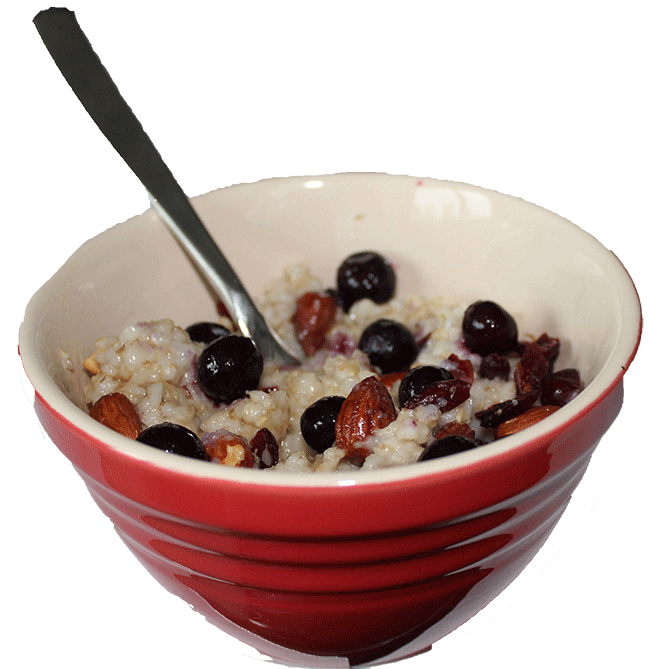Urban School students start the day right with healthy breakfasts
A common breakfast for Urban students: oatmeal with toppings.
It is 8:10 in the morning, and Urban students are turning as much attention as they can muster to their A-period teachers.
Take Brooke Roberts’ A-period history class. Like all high schoolers, the students there are sleep-deprived and groggy, but there’s one problem they don’t have: Most of them ate breakfast.
Monday begins National School Breakfast Week, a time when public schools across the nation are encouraged to promote school breakfast as “convenient, healthy, and a real timesaver!”
This is a message that Urban students don’t appear to need. An informal poll of students in three A-period classes during the week of Jan. 6 revealed that only one in 10 had skipped breakfast.
“What gets me through the day is breakfast,” said Lars Archer (’16).
However, not all students are so nutritionally aware or economically fortunate as to make the right decision. For students in public schools, the School Breakfast Program helps families that either can’t afford, or don’t provide breakfast.
SBP is a federally assisted meal program that began in 1975. SBP “was established to ensure that our nation’s schoolchildren have access to a well-balanced meal every morning that class is in session,” according to a description at usda.gov. SBP spent $3.3 billion feeding more than 12.9 million children every day in 2012, or an average of $255.81 per child.
For high school students, an SBP breakfast provides 450 to 600 calories, including a minimum of one serving of fruit, grains, and milk. According to the USDA, “(s)tarting the day with breakfast has been associated with improved academic performance, improved classroom behavior and attentiveness, and fewer visits to the nurse.”
Urban students seem to already have this message in mind.
“I’m a morning person just because I like breakfast. I’m excited to wake up just to eat it,” said Sonia Fillipow (’16).
“I can’t learn if I don’t eat,” Archer added. “I feel ready to go when I eat breakfast.”
He also recounted the importance of breakfast for athletes: “For cross-country (team), I need a lot of energy, so I need a lot of carbs and protein and I can’t do that during lunch.”
In addition to being more nutritionally aware, Urban students have easy access to healthy foods.
For Gwen McLaughlin (’16), eating breakfast at 7 a.m. isn’t very appealing, but she still sees the value of a good breakfast. “I try to eat something during break,” she said.
Urban’s school café is open before A-period and during breaks, with many healthy options. If venturing to Haight Street is more appealing, there are many options for snacks there as well. Regardless of where they eat, students are at a great advantage for being able to purchase breakfast in the first place.
Urban’s health program plays a role in helping students make educated decisions. Jenn Epstein, the freshman health teacher, advocates that students should pay attention to what their bodies need.
“Breakfast is important because it fuels our whole morning. Not eating breakfast contributes to fatigue and not feeling well,” Epstein said.
For those like McLaughlin, or students that don’t have time in the morning, Epstein has a few recommendations.
“Smoothies are great. They taste good, and can be sipped slowly. You can make it the night before, and put almost anything in it,” she suggested.
“With time, you can make breads or muffins the night before. Hardboiled eggs and granola are also great options.”
Jenn warns against the impulse to go for a quick energy rush: “Breakfast can be lousy, with a bunch of sugary cereals and flour.”












